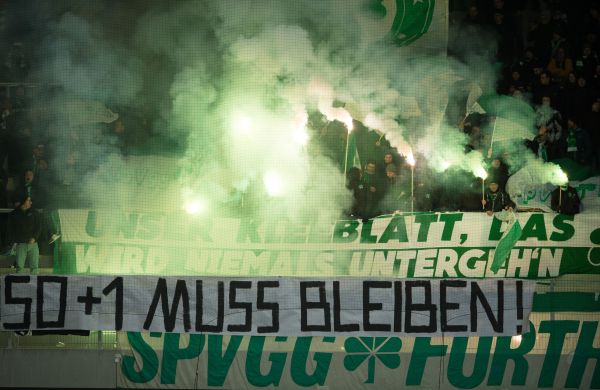Germany’s sacred 50+1 rule is mentioned whenever football, power and politics come together. But how does it work and could English football really adopt it?
Germany’s 50+1 rule tends to be brought up whenever the lines of football, power, politics and greed begin to overlap.
An example of this is the thwarted attempt by 12 clubs to start an exclusive European Super League. Six teams from the Premier League joined the most powerful members of La Liga and Serie A to try and create a closed competition which would line their pockets at the expense of tradition, fairness and sporting integrity.
German clubs were not involved. There were a number of reasons for this, including the 50+1 rule. It is an integral part of the German game, and affects everything from ticket prices and safe standing to club presidential elections.
But how does it work, and could it be implemented in the Premier League? Let’s start with the basics.
What is Germany’s 50+1 rule?
Germany’s 50+1 rule states that football clubs must hold a majority of their own voting rights. Members – the actual fans themselves – enjoy a 51% voting majority when it comes to any and all decisions. Commercial investors can make suggestions, and often do, but unless fans behind them, nothing can happen.
An example would be Hannover’s recent ousting of club president Martin Kind, who was forced to step down in 2019 after the then-Bundesliga club’s 2,100 members voted to replace him. Kind was deemed to be too powerful by the fanbase, who took action to install a new supervisory board that would have their best interests at heart. Kind remains the club’s chief financial backer, but his ability to make big decisions has been reduced.
Compare this to the Premier League, where supporters have almost no say over the way their clubs are run. Fans of Newcastle and Manchester United have long protested the direction greedy owners have taken their clubs in, but they are unable to influence matters at board level. Essentially, unless these investors decide to sell up, fans are stuck with them.
’50+1 is a very important aspect of German football,’ Tobi Altschaeffl, Chief reporter at German outlet SportBild explains to FourFourTwo. ‘It’s rooted in our footballing traditions, and is the reason we have such strong fan groups in this country. We recently saw, with the proposed European Super League plans, just how much Borussia Dortmund, Bayern Munich, and in fact all of the Bundesliga clubs, value these traditions.
‘The 50+1 rule didn’t directly prevent German teams participating in the European Super League,” he continues. “But the outcry among fans was clear and football in this country lives and dies on the opinion of fans. Of course, it never got that far, but the fans could have stopped it.’
In short, the 50+1 rule is the reason ticket prices remain low, stadiums stay full, flags, banners and choreos are permitted in grounds, alcohol is sold on the terraces and the traditions of clubs are upheld and respected by those at the top.
What are the negatives of 50+1?
There are those who oppose the 50+1 rule. One main reason for this is that it deters new investors. Why should billionaire owners sink their cash into Bundesliga clubs if they don’t even get to have the final say on decisions?
How is any team expected to loosen Bayern’s grip on the Bundesliga title, people ask, if they can’t compete financially? Bayern have built an unstoppable brand as things stand, but not even they could compete with a club bankrolled by a Middle Eastern state.
If, say Freiburg, were taken over by Sheikh Mansour tomorrow, Bayern would feel far less certain of a tenth straight Bundesliga title next season. People argue it would be good for the competition.
The Premier League is a far better bet for new investors. Roman Abramovich, Chelsea’s billionaire Russian owner, has the power to do as he pleases with the club he bought for £140 million in 2003. He could bulldoze the stadium, change the crest and appoint himself manager if he wanted. From the fans’ side, that would be awful, but ask investors which option they’d choose.
How do clubs get around it, and why are people so annoyed with RB Leipzig?
While adhering to 50+1 is compulsory for any team competing in German Football League (DFL) competitions, some have found ways to circumvent it.
Bundesliga clubs, including Wolfsburg, Bayer Leverkusen and Hoffenheim have drawn ire from opposition fans for being majority-owned by commercial investors. The owners of these clubs were granted the lion’s share of control after proving their financial responsibility over a 20-year period, the minimum timeframe required to do so. Even still, flouting the sacred 50+1 rule is a serious breach of trust among German football fans and these clubs are deemed to have crossed a line.
The biggest offender, however, is RB Leipzig. Known as SSV Markranstadt as recently as 2009, the former fourth-tier side is now operating under a different name, in different colours, in the Champions League.
Technically speaking, Leipzig do follow the rules, but the way they go about things is questionable. While other Bundesliga clubs have memberships made up of thousands of fans – hundreds of thousands in some cases – Leipzig have around 20 members, all of which work for the energy drink brand.
‘RB Leipzig are labelled a ‘plastic club’ – a marketing tool for Red Bull,’ explains Altschaeffl. ‘They have a lot of critics in Germany despite their on-field success. They have great players, but they don’t have a proper fan culture, with passionate ultras, because they’ve bought their success and not earnt it. They are not tuned in to the football culture in this country.’
Could 50+1 be implemented in England?
Supporters in England have started calling for the implementation of a 50+1 rule in English football, particularly in the wake of the European Super League debacle.
English fans feel increasingly out of touch with the clubs they support, due, in no small part, to soaring ticket prices. For reference, the most expensive season ticket in the Bundesliga costs £202 – charged Paderborn. That’s more than £100 cheaper than the cheapest in the Premier League – offered by West Ham United – and around £2,000 cheaper than the priciest, at Tottenham Hotspur.
Bundesliga fan groups believe a similar 50+1 rule could help reconnect disgruntled fans with Premier League clubs.
‘I think it could be one brick in a big wall,’ Alexander Fischer from Club No.12 – a Bayern Munich fan group – told the Press Association this week. ‘It would be a good start to bring back the football to the people.’
Those in favour of implementing the rule will be buoyed by news that the British government is exploring ways in which fans could have greater influence in the national game.
Boris Johnson went as far as to announce “a root-and-branch investigation into the governance of football and the role of fans in that governance.”
Meanwhile, Culture Secretary Oliver Dowden noted that “German leagues have a different governance structure” before claiming it would be ‘right’ to look at how those ideas could be adopted.
The European Super League’s demise has proved what can be done if fans stand as one. English football remains a very long way from the German model, but recent events may prove to be the first en route to something our Bundesliga counterparts value above all: the right to have a say in the way the clubs they love are run.





